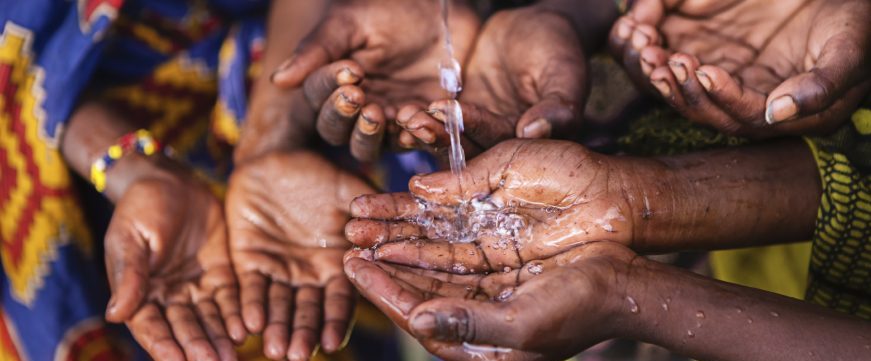In the spotlight: Businesses’ responsibility to respect the right to water

10 December is International Human Rights Day. Today, we are highlighting the right to water and businesses’ responsibility to respect that right. Read Dr Jenny Grönwall’s blog below on a future treaty that could make it easier to hold companies to account for human rights violations.
Explore #StandUp4HumanRights hashtag in social media!
In October this year, a UN Working Group debated a zero draft of a #BindingTreaty for Human Rights applicable to transnational corporations and other business enterprises. The idea is that a future agreement would accompany an international standard already in use since it was endorsed by the Human Rights Council in 2011: the UN Guiding Principles on Business and Human Rights. Both the existing Principles and the future treaty depart from the requirement that companies avoid infringing on the fundamental freedoms and entitlements of others—such as the right to safe drinking water.
A major problem with the UN Guiding Principles is, of course, that they are voluntary. Another is that they let companies themselves determine which are the most severe risks and sources of greatest harm to people that occur as a result of their operations. An apparent example of these limitations comes from the shoes and apparel industries’ wastewater discharge. The stores where we purchase the items we dress in are inevitably connected to suppliers and manufacturers, that are in turn interlinked in rather complex value chains. The responsibility to respect human rights therefore entails a need for brands to look upstream the value chain, at sub-suppliers who do the actual dyeing of fabrics and tanning of hides.
Some 20 per cent of all industrial water pollution is connected to the making of textiles and most of those operations are located in less developed or developing countries. The wastewater generated tends to contain non-biodegradable components like heavy metals and colour fixation salts. When these reach rivers, streams and groundwater reservoirs untreated (as on average 62 per cent do), they can have devastating impacts on people’s health when their drinking water sources are slowly ruined. But the nature of those pollutants makes this a largely invisible problem.
The Guiding Principles may represent society’s belief that the private sector should take a wider responsibility for discharges even when the production has been outsourced. But point-source pollution and improper treatment of effluents can be difficult to trace back to individual factories; the issue of who is ultimately accountable is a challenging one. Poor regulatory frameworks, under-capacitated executive authorities, corruption and methods such as concealed night-time discharges, are among the reasons why small and large companies alike can continue to—in effect—infringe on people’s human rights.
Indeed, one of the biggest challenges for sustainable business as it relates to human rights has been connected with the collective impacts. As Margaret Jungk has formulated it, the human rights field is advanced when it comes to addressing singular-level impacts on human rights—for example, if a company has a discriminatory labour practice or an unsafe working environment. However, where negative impact results from the combined actions of multiple companies—such as when no single company exceeds the general emission standard, but the combination of polluters in the area makes the water unfit for drinking—assigning responsibility becomes more difficult.
The treaty now on the table would not ease any of those constraints by introducing certain binding norms. But it would clearly contribute to highlighting the role of long supply chains and the way in which transnational companies all too often release themselves from any obligation to act by saying they have no way of knowing what takes place at sub-sub-suppliers in far-off countries. Notwithstanding a large number of limitations, Greenpeace comments that the zero draft includes comprehensive provisions on civil and criminal liability of corporations in national law, most notably making them liable in certain instances for the actions of subsidiaries and associated companies in the supply chain.
As of yet, the Guiding Principles—and not least what they stipulate in the wider environmental field—are largely unknown among fast fashion end-consumers. To me, this has much to do with the difficulty in communicating visually what, for instance, ‘improper wastewater treatment’ actually looks like. It is not as simple to capture in a photo as a child working in a factory; it doesn’t look like the Rana Plaza after the 2013 collapse. Absence of steps taken that could contribute to ensuring that water leaving a factory meets set standards isn’t easily snapped and spread in social media. Hence, ignorance is bliss.
Therefore, a group I place some (possibly far-fetched) hope with is the so-called influencers. In Sweden, the official Christmas gift 2018 is the recycled garment, supposedly reflecting the interest here for new sustainable alternatives and increasing concerns about climate and environmental issues. According to research by the Swedish Institute of Retail into products that represent something typical of the year, this also signifies ‘consumer power’ and the mainstreaming of ‘circular’ systems, where (the materials in) our clothes are used more than once. May they be correct and may fashionistas of the world join hands for everyone’s human right to safe drinking water.







